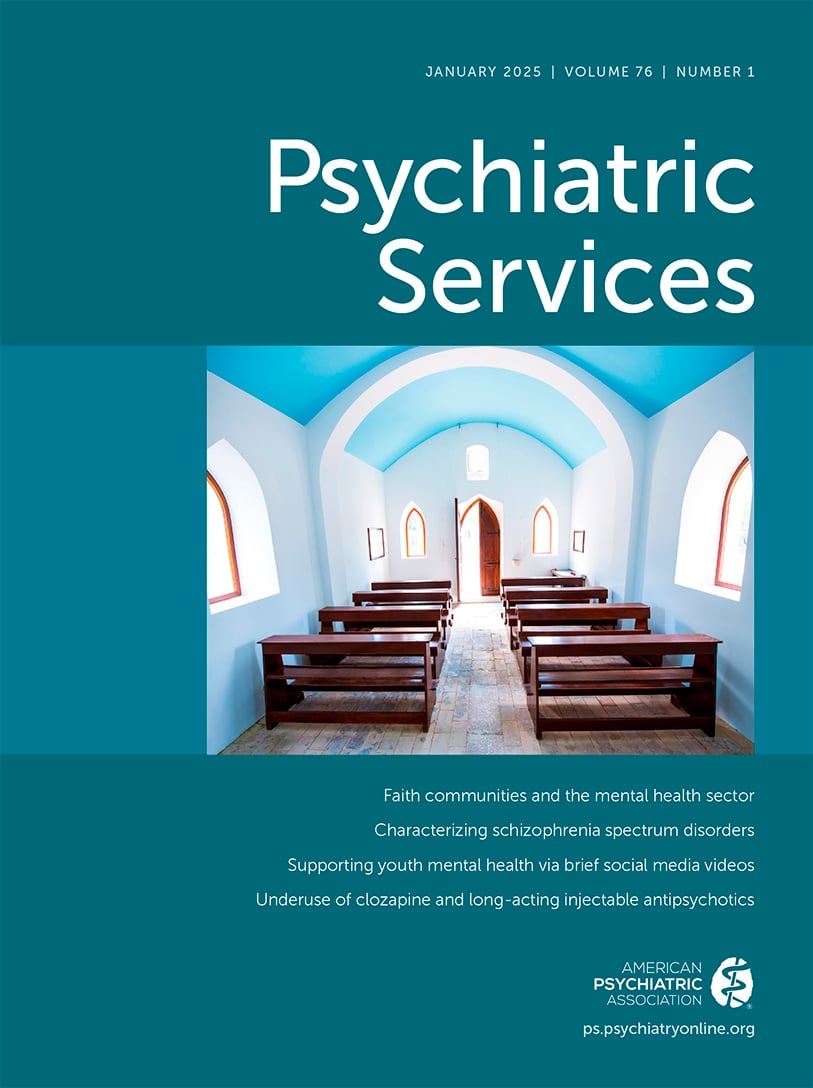Psychiatric Services
- Volume 37
- Number 5
- May 1986
Article
Publication date: 01 May 1986
Pages437–445Given that the aftermath of crime represents a crisis for the mental health system, the criminal justice system, and the public as a whole, the panel recommends. • Availability of multiple models of services for victims. • Development of standards of ...
https://doi.org/10.1176/ps.37.5.437Publication date: 01 May 1986
Pages457–467Increasing laboratory and clinical research during the past 25 years has greatly enhanced understanding of hypnosis. Drawing on this research, the authors illuminate the many factors that define the domain of hypnosis, the most crucial of which is ...
https://doi.org/10.1176/ps.37.5.457Publication date: 01 May 1986
Pages467–474The author reviews the status of the state mental hospital and the chronic mental patient within the psychiatric service system and then examines the hospital's evolution from a systems perspective. She predicts that the state mental hospital will survive ...
https://doi.org/10.1176/ps.37.5.467Publication date: 01 May 1986
Pages475–480Three areas of legal change have had major effects on the chronic mentally ill: substantive and procedural alterations in civil commitment laws, the limited implementation of a constitutionally based right to treatment, and the partial recognition of a ...
https://doi.org/10.1176/ps.37.5.475Publication date: 01 May 1986
Pages481–484To assess whether long-term outcome of former drug abuse patients who had psychotic symptoms was related to duration of psychosis before hospitalization, the authors rated the psychiatric, occupational, and residential outcome of 101 former drug abuse ...
https://doi.org/10.1176/ps.37.5.481Publication date: 01 May 1986
Pages485–490The research literature suggests that social support moderates the harmful effects of stressful life events and helps to regulate an individual's mental and physical health. However, the author believes that conceptual and methodological flaws in the ...
https://doi.org/10.1176/ps.37.5.485Publication date: 01 May 1986
Pages490–492Patient noncompliance can sabotage the best clinical efforts to provide effective treatment. Psychiatrists consulting in a medical setting can promote patient compliance by using insights from four conceptual models of psychiatry: medical, psychodynamic, ...
https://doi.org/10.1176/ps.37.5.490Publication date: 01 May 1986
Pages493–496As a result of changing perspectives in psychiatric practice and increasing fiscal limits imposed by legislative and economic issues, psychiatric nurses have found their traditional models of practice challenged by shortened lengths of stay and the need ...
https://doi.org/10.1176/ps.37.5.493Publication date: 01 May 1986
Pages497–501The author argues that psychiatry is not a medical specialty but an instrument for the social control of people whose ideas, actions, values, and life-styles threaten or disrupt established power relationships within families, communities, or society. ...
https://doi.org/10.1176/ps.37.5.497Publication date: 01 May 1986
Pages501–504As long as psychiatrists are human, there will be episodes of unethical psychiatric practice and ineffective, sometimes damaging psychiatric treatment. The author argues that these incidents do not detract from the overall integrity of the profession, the ...
https://doi.org/10.1176/ps.37.5.501Publication date: 01 May 1986
Pages517-a–517In the March 1986 H&CP, on page 241 of "Stress-Response Syndromes: A Review of Posttraumatic and Adjustment Disorders" by Mardi J. Horowitz, M.D., the editon of the text Psychiatry, Volume 1, in which parts of Dr. Horowitz' paper appear, should be listed ...
https://doi.org/10.1176/ps.37.5.517-aPublication date: 01 May 1986
Page540The Ideas column features brief notes about interesting or unusual programs, novel approaches to therapy, and useful resources in the mental health field. Contributions to Ideas are welcomed. Items, not exceeding 200 words, should be sent to the Editor, ...
https://doi.org/10.1176/ps.37.5.540Past Issues
View Issues Archive
Vol. 76 | No. 1

Vol. 75 | No. 12

Vol. 75 | No. 11
